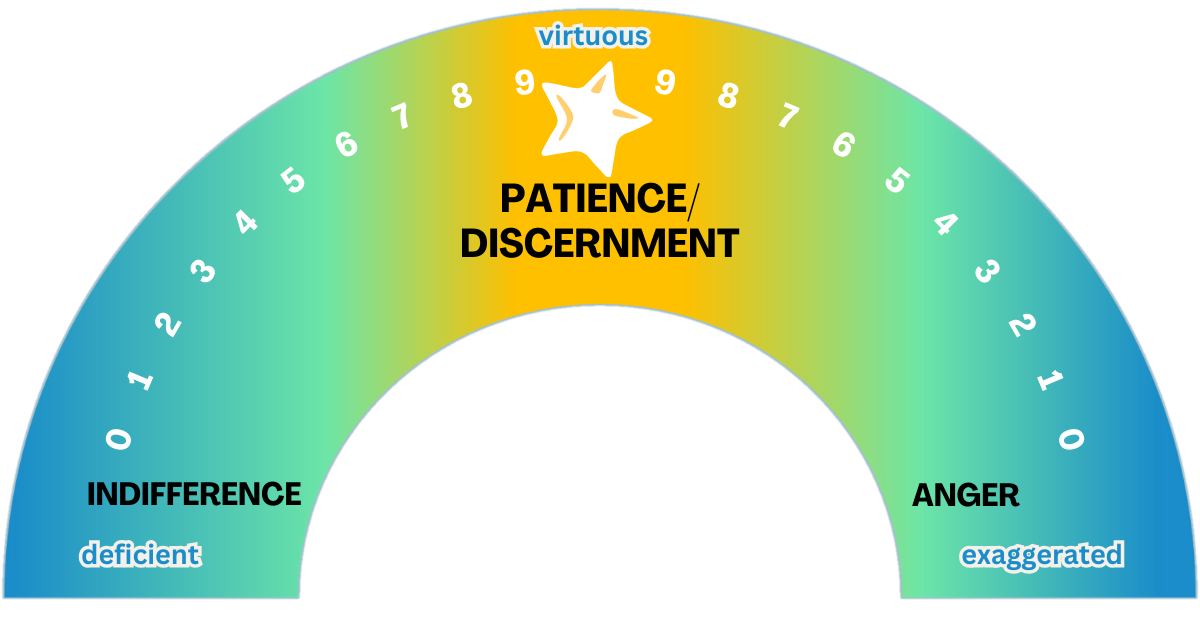Throughout our days and years, challenges inevitably arise, testing our patience and resilience. Each of us has a distinct approach to handling these situations, influenced by our character traits and attitudes. In this section, we’ll explore the character traits and attitudes that shape how we respond to those trying circumstances.
The Continuum
Along the continuum of emotional response, individuals can fall at various points. On one extreme is indifference, characterized by emotional detachment and disinterest. On the other extreme is anger, marked by easily provoked feelings of hostility or frustration. The virtuous path lies in the center, where individuals practice patience and discernment, taking the time to understand situations before responding and managing their emotions thoughtfully.
People may find themselves at various positions on this continuum. To make things even more complex, some may shift their position based on the circumstance. For instance, someone might remain calm and patient in most situations but demonstrate frustration when faced with certain triggers or stressors.
Indifference: On one end of the spectrum, there are individuals who exhibit indifference, often appearing emotionally detached and disinterested. They avoid engaging with situations or people, displaying a lack of concern and involvement.
Detachment: As we progress along the continuum, we encounter those who maintain a detached demeanor. These individuals may acknowledge situations but choose to remain uninvolved, not allowing circumstances to affect them deeply. Their responses are often measured and devoid of strong emotional investment.
Patience: In this context, patience entails taking the time to understand the situation before responding (discernment), striking a balance between impulsively reacting out of anger and remaining indifferent. These individuals practice patience by considering all aspects of a situation, managing their emotions, and responding thoughtfully.
Frustration: Moving further along, there are those who begin to show signs of frustration. These individuals may struggle with maintaining patience, occasionally allowing their irritation to surface. They are aware of their emotions but find it challenging to stay composed, leading to sporadic expressions of annoyance.
Anger/Irascibility: Finally, at the far end, we find those who are prone to anger or irascibility. These individuals react impulsively and intensely to triggers, often expressing their emotions through outbursts or aggressive behavior. Their responses are quick and driven by strong feelings, making it difficult for them to maintain control in challenging situations.
Benefits of Patience
When we cultivate a balanced approach to patience, finding the equilibrium between indifference and anger, we promote emotional resilience and harmony in our interactions. This balance enables us to navigate life’s challenges with grace and wisdom, fostering healthier relationships and inner peace.
Here are some benefits:
Engaging Thoughtfully: When we approach life with patience and thoughtful engagement, we empower ourselves to make informed decisions and respond in ways that resonate with our true selves, and are applicable to the situation.
Purposeful Action: With each purposeful action we take in our lives, there is this sense of fulfillment and progress towards a well-lived life. Embracing patience and deliberation allows us to navigate obstacles with resilience and determination, moving us closer to the life we envision for ourselves and inspiring others along the way.
Positive Emotional States: When we practice patience and deliberation, there is a peace and contentment that fills our hearts. By maintaining a positive outlook and staying grounded in the present moment, we cultivate inner peace, confidence, and a deep sense of gratitude for the beauty of life and its endless possibilities.
Investment in Relationships: By actively listening, understanding, and supporting those around us, we foster stronger bonds built on trust, compassion, and mutual respect, creating a supportive network that enriches our lives immeasurably.



